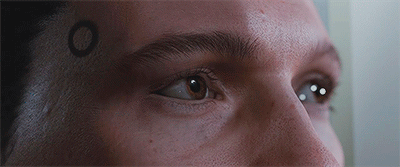Humanity is a fascinating cinema where we get front-row seats to watch as we learn, grow and adapt every single day. Quantic Dream’s Detroit: Become Human is an intriguing look into how one day we may co-exist with other beings. I took a leap right into this game.
Back when Detroit was first announced, after we had a long beat of time post-Beyond: Two Souls, I remember being bewildered at what this world of Kara’s would be like. After the release of Beyond: Two Souls, and Quantic Dream’s successful journey into using American actors, I wondered if their next title would be dancing those same paths to tighten up the issues some had about their past games. The darkness and depth of topics in the PlayStation 3 title Heavy Rain came with a slight cringe that the voice actors had with adjusting a French accent into an American one; it played poorly on the ears and seemed to generate more discussion from the Internet than the actual bulk of the game. While fans still swarmed to this title, Beyond: Two Souls was where people started taking them a bit more seriously. The team at Quantic Dream was finding their flow.
Jump ahead to the tech demo to show what they were aiming for with their follow-up title from Beyond: Two Souls. Simply named ‘Kara’, the tech demo was a teaser trailer to show what their next game would have coming. Now, the tech demo is visually outdated as it was using the engines, artwork and such that they had used during Beyond’s lifecycle. What it showed, however, was a tone they were setting for their next game and we were ready for it.
When Detroit was announced, many of us knew it would have something to do with Kara, who we had already met during the tech demo years prior. The teaser trailer showed a futuristic Detroit in a world where androids were a part of the scenery. They were housemaids, lawn care, infrastructure services and they taught our children. In this future Detroit, androids were like buying yourself a brand new cell-phone. It was just what you did.
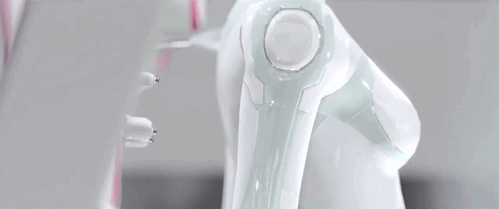
(Quantic Dream, Sony)
With this concept in mind, we were squinting at our screens and wondering what kind of story this would mean. Fans of Quantic Dream, much like myself, were all a’flutter with where the team would go with a story of that magnitude. Were we going to play several characters or focus on simply one? As trailers trickled out, the fascination sprawled deeper through my brain and tip-tapped on every creative thought to what this game could be.
Let’s fast forward once again. We’ll rush through the out-of-context outrage people had when they saw clips of the game which showed traumatic experiences but didn’t spoil the outcome which would give players closure. We’ll skip through the social media thoughts on the game and its director before the game had even been released. A lot of people have things to say and feel and I’m not here to tell anyone that’s wrong, but a studio like Quantic Dream is so much larger than one person. Besides, we already covered David Cage opening the studio and to me, that’s where it being his sole property ends. Quantic Dream is far more than its founder and co-owner now. It lives in the nimble fingers and brilliant minds of every artist, actor, musician and code developer that sits in those Parisian offices.
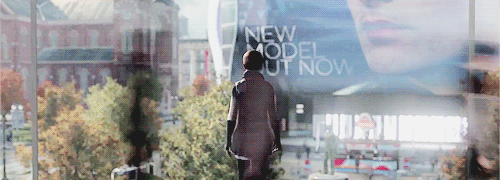
(Quantic Dream, Sony)
With that said, Detroit finally released and I wasted not a moment. The second it was available to me, I ran head first into a story of a bleak world of lost souls. In this Detroit, it wasn’t so difficult to have an android of your very own and that meant that they weren’t treated like highly prized items. This wasn’t like when you polish a car, androids were sold in open Radio Shack like stores and left on display to be pushed at and prodded by people just milling around strip malls. I was given the opportunity to play three different androids. One brought back to the world after an ‘accident’ had damaged her, one who played an assistant and housekeeper to a disabled artist and then one who was very purposely working within the peacekeeping sector.
Each had an interesting shift of story that would take place almost immediately. You learned fast what each character was working with and through their eyes, you were able to absorb how humans around them lived. Some were on a street drug called ‘Red Ice‘ and wasting their lives away while androids cleaned up after them and kept appearances. Some were aware of how lucky they were to have these programmed servants but ultimately unable to accept they were machines. Then, you had Connor.
I took to Connor almost immediately. A pleasant-faced, bolt-straight android who was sent by the company that produced the androids to help find why a string of them were breaking programming protocols. It started with Daniel, was an android housekeeper and nanny that seemingly snapped sending his evenly-keeled programming off-the-rails. Now we had a suicidal and homicidal android hoisting a child towards the edge of their high-rise patio. Connor stepped into the door and you, as the player, are helping him study every possible event that could’ve lead to this android’s deviant behavior while also milling over how to stop Daniel from leaping off the building and/or dropping the child as well. You’re encouraged to scan and study, rebuild scenes before your eyes to figure out why and how this could’ve happened.
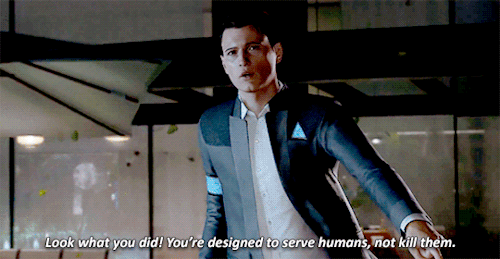
(Quantic Dream, Sony)
Then, as is the only possible final step, you as Connor ease onto the balcony. The scene moves so fast and you’re asked in real time to make choices and ask questions based on how you moved through the apartment. Did you find specific items? Did you scan the rooms well enough? Padlocks show up if you missed a thing and will send anyone into a frenzy, like it did for me. I found myself consulting the flowchart repeatedly and kicking myself. I’d softly mutter under my breath “I’ll get that on the next playthrough” and push through to the next android’s scene.
And that is where Detroit captured me. Connor, to be honest, feels the most closely aligned to who I was coming into this. An investigator, of sorts, attempting to piece the stories together and understand what is happening with the androids around them. Connor asks questions and studies, while Kara and Markus are trying to live their best lives with their new found freedoms. Come hell or high water, Connor intends on figuring out where this started and what the deviancy and program breaking in these androids means. Does it mean a virus? Is it a hack in programming code? What happened here?
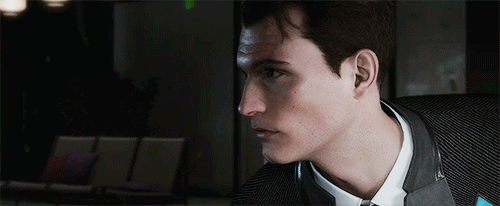
(Quantic Dream, Sony)
It is through Connor that we start to realize that humans are asking so much of these creatures that were built and established in our own image. Connor watches as a go-between of the androids and humans and you can see his stablizes on the side that holds him grounded. In moments, you wonder if Connor recognizes the nuances and you see through his eyes that he still has a job to do. It’s in the moments, however, where you see him save a step in order to not complete his job but to help someone else — that he is more real than even he wants to give himself credit for.
This is where Detroit soars.
Each scene has a loving attention to its surroundings and its atmospheric music. Orchestral swells of tension or mind-numbing softness that almost threaten to lull you into the decay of the city and its people. Within the eyes, missing that Uncanny Valley aspect that so many games are riddled with even in 2018, you see worlds of possibility. Their skin looks touchable. Their voices have a tremble to them in moments and a robotic clarity in others. The game grasps your wrist from moment one and pulls you through it, even sometimes through despair and other times soaring triumph. It wants you to feel the finality of how you lead these androids through their lives.
